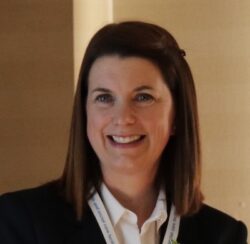Earlier this year, Scotland passed the Circular Economy Bill to help increase recycling and reuse rates.
But what is the circular economy and what does it mean for NHSScotland?
We caught up with Wendy Rayner, Head of the NHS Circular Economy Programme in the Scottish Government, to talk about exactly that – and to tell us about some of the work already taking place to support the move to a circular economy.

So, what is the circular economy?
“It is no single thing or action. The circular economy describes activities which keep products and materials as active parts of our economy.
“People often ask if it’s like taking your bottle back to be refilled or recycled – it is, but it’s also so much more.
“The circular economy is about reducing the demand for raw materials and avoiding waste wherever we can. It’s about encouraging reuse, repair, remanufacturing and recycling.
“It’s about maximising the value of waste by being able to separate and recover materials.
“It’s about changing the way goods and services are designed and procured. And it’s about providing long-term access to innovation, eco-design and new technologies.
“At the heart of the Circular Economy Bill is the desire to make re-use and recycling the default choice for Scottish households and businesses.”
Why is the circular economy so important to NHSScotland?
“The circular economy is a core part of Scotland’s transition to a fair, green and sustainable economy – and achieving our net zero ambitions.
“NHSScotland is one of the largest employers in Scotland, and contributes about 5% to Scotland’s overall carbon footprint. Data from NHSScotland and across the UK shows that the products and services the NHS procures account for over 60% of the NHS’s total carbon footprint.
“This means that working towards a circular economy is one of the most effective ways we can reduce our carbon emissions.
“It can also help us to improve health outcomes, save money and adapt to future challenges – as well as increasing resilience in our supply chain, ensuring NHSScotland has access to the goods we rely on now and in the future.
What is happening in NHSScotland?
“The NHSScotland Climate Emergency and Sustainability Strategy sets out what we’re doing to support Scotland’s transition to a circular economy.
“And there’s a lot happening – some of it more visible and other initiatives taking place behind the scenes.
“We’re working with supply chain partners to look at replacing some single use products with quality re-usable products. Re-use isn’t a new concept and hospitals already have systems in place manged by expert laundry and decontamination teams. Working with those teams we can look at what is possible now and in the future.
“We’re also working on increasing quality recycling from NHS waste streams, including recovering high quality plastics – and working with the supply chain to see how this recycled plastic can be reused.
“We’re also asking NHSScotland staff to reduce the unnecessary use of products – like our glove awareness campaign which asks colleagues to only wear disposable gloves when they’re needed.
“Understandably, making changes takes time. Patient care is at the heart of everything we do, so we need to ensure the highest standards are in place.
“There is so much great work already taking place – one of the parts of my job I find most inspiring is the sheer range of passionate, expert colleagues I get to work with. This includes the NHSScotland Assure team providing national technical support, the national Green Theatre Programme team, the National Procurement team and the clinical, estates and specialist teams on NHSScotland sites.
“By working together to move to a circular economy, we have a real opportunity to make significant carbon and financial savings.”
As NHSScotland colleagues, how can we all help to move towards a circular economy?
“Supporting recycling efforts is vital. Sorting our waste correctly will help us save money, make NHSScotland more sustainable and help us meet our legal requirements.
“It might feel like a small action, but something we can all do. And it’s the cumulative effect of all our small actions that make a big impact – making change a reality.
“We can all make a difference if we think before we throw.
“Your expertise and experience are incredibly valuable – please get in touch with your ideas, suggestions and questions.”